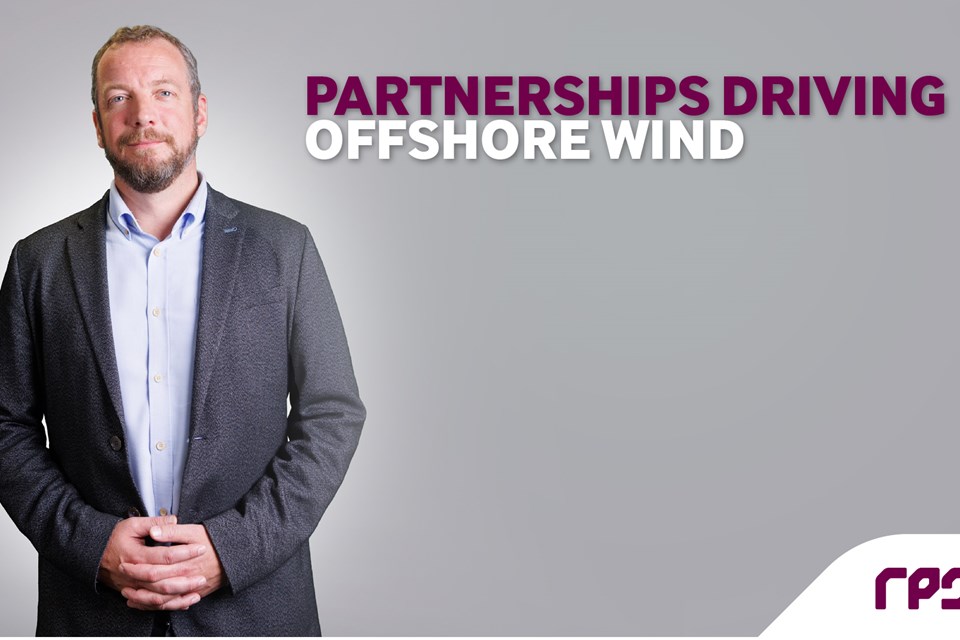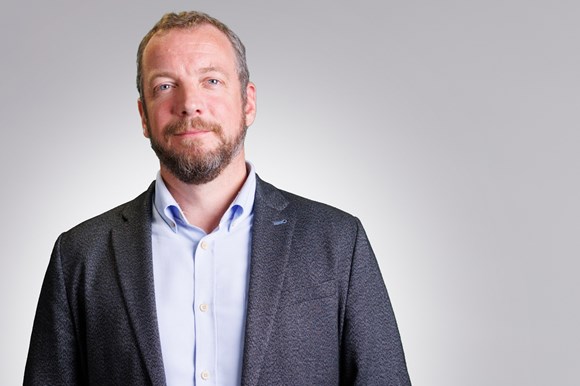How partnerships will help us confront the offshore wind industry’s challenges
Growing demand for offshore wind projects means new pressures on the industry. In the first of a new series of insights, RPS’ Alun Williams, who has been in the industry since its beginnings in Europe, talks about what he sees as one of the most important solutions to these issues. We’ll also explore some examples in the video below.
The offshore wind market is expanding rapidly, or has ambitions to do so. Around the world, governments have put tough carbon reduction goals in place. This trend has increased over the past year or so coming out of COVID-19, but also been driven partly by energy security concerns.
Although these are positive steps for the climate and economic recovery, the challenges of deploying offshore wind projects at scale, at speed, are coming into stark relief. We feel that it’s time to talk seriously about partnerships and collaboration as a vital means of getting (increasingly urgent) net-zero carbon goals over the line.
Global challenges for offshore wind
Why is it so important to talk about partnerships? Well, ambition is high: every week, new project announcements follow new lease auctions and big jumps in the gigawatts (GW) of energy generation some regions are aiming for.
Those in the industry know that the market is moving into new geographies where the industry doesn't currently exist. We’re also seeing more plans to deploy larger projects or multiple projects in parallel. This is happening in some of the new and emerging markets we work in, where we would historically have seen single projects going into development. The industry is looking to grow at a scale it has never seen before – and sometimes, from a zero base.
In newer markets, a lack of offshore wind experience and track record may affect deployment speed and scale, especially where multiple projects are concerned. These markets may have huge experience in infrastructure and other offshore development, but lack:
- Specific offshore wind knowledge and skillsets
- Regulators who are used to consenting/permitting for offshore wind, and consultants experienced in anticipating and addressing their concerns
- A supply chain that’s ready for offshore wind, and perfectly adapted to it.
That’s not to say that knowledge-based, technical, and even social challenges are limited to new markets. In the UK, one of the more mature markets, it’s argued that the time it takes for new regulators, consultants and developers to get up to speed with this complex industry is directly linked to delays in consenting/permitting approvals. (The recent training developed by RPS on behalf of OWIC in the UK was partially aimed at easing this challenge.) This issue isn’t good news for an industry so keenly aware of the clock ticking – but there are answers, and within reach.
Finding solutions: partnering for success
To solve some of these challenges, I believe what the industry needs is a framework that will allow it to gear up quickly. On the one hand, training and support are essential to bridge knowledge gaps. We’ve discussed this in a previous article on easing development bottlenecks related to consenting/permitting (which you can read here).
On the other side are partnerships – which will be needed to ensure projects can be resourced and progressed with the right skills, deployed in the right locations, and in the timescales developers need. To help the industry achieve its ambitions, fruitful collaborations are needed at various levels – not just between developers, but also between consultancy firms themselves. These partnerships will allow the industry to address resource constraints, give and get the best quality advice, enable development of cutting-edge, bankable technology, and achieve greater understanding between stakeholders.
Resourcing ambition: the ‘elephant in the room’
In the offshore wind industry at large, the question of how to resource future projects as demand grows is sometimes left unspoken. It’s an issue that providers may be afraid to bring up, but which will strike a chord with many.
There simply isn’t enough offshore wind expertise in the world to move it where it’s needed for every project. In the UK alone, for instance, the industry could be employing 100,000 people by 2030. The resource gap isn’t just a question of skilled providers either: it affects the entire renewables supply chain, so the industry (and governments) needs to get in front of this challenge.
What's more, with growing ambition for this sector, it’s our belief that no one consultancy could meet all of the market’s needs. RPS has one of the industry’s broadest service offerings, backed up by technical expertise and decades-long experience – yet we recognise that collaboration is healthy as well as necessary. No consultancy could be expert in every sphere of this complex, ever-evolving space; our sector needs to address its needs through collaboration. This is one of the reasons why RPS builds its own strong partnerships, empowering our clients while contributing to the industry’s future development.
What else can partnerships do for the offshore wind industry?
Of course, partnerships aren’t just about solving resource constraints. This is but one challenge for a growing industry. Instead, our sector should be thinking about what it can achieve through partnerships. For example, developer Equinor recently announced its own new collaboration, commenting on how partnerships could accelerate technological development, help with local content needs and boost the supply chain, but also enable cost reductions.
We are all keenly aware of the reasons for accelerating offshore wind projects, and that these are considered increasingly urgent. Coming together as partners – creating shared value that also benefits the world we share – is the best way to keep driving these goals forward.
The next part of this article is a deeper dive into the benefits of offshore wind partnerships, with examples from some of our projects. Watch this short explainer video below to learn about these.

Have you read our previous insight on challenges for the renewables supply chain? If this is a topic you need to know more about, click here.
If you have questions about offshore wind, feel free to contact Alun at williamsal@rpsgroup.com

